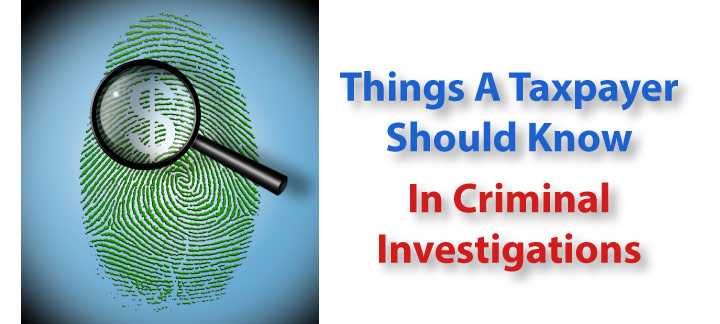Things a Taxpayer Should Know in Criminal Investigations
An important part of surviving a Criminal Investigation process is understanding and reasonable expectations on the part of the taxpayer. If a taxpayer understands the process as it proceeds, he or she will be less likely to undermine the goals of the investigation or take any steps to exacerbate his or her own precarious situation. While under investigation, taxpayers often have questions about particular topics. Giving the taxpayer a better understanding of common issues that arise during the course of criminal investigations can provide peace of mind and help keep client goals on track.
Maintaining the Integrity of the Taxpayer’s Defenses
As with any criminal prosecution, the defendant and his or her attorney enjoy attorney-client privilege, the exemption from discovery of attorney work product, and Fifth Amendment privileges in criminal tax cases. However, these protections can be lost if the taxpayer and counsel are not vigilant in protecting them. The privileges can be lost through accidental disclosure of confidential material, as well as deliberate disclosures made to regulatory agencies such as the Small Business Administration, Securities and Exchange Commission, and the Defense Contract Audit Agency.
Beyond accidental and deliberate disclosure, taxpayers and counsel should also take steps to prevent information from being revealed through careless disclosure. Along these lines, counsel and taxpayers should make sure that they do not have confidential conversations in a location where human eavesdropping or electronic surveillance is possible, or in the presence of someone who is not necessary to the communication between the attorney and client. The taxpayer and counsel should also be very careful to never leave confidential documents or written materials unattended.
The Use of Search Warrants in Criminal Investigations
Search warrants have become quite common in criminal investigations. Special agents conducting criminal investigations for the CID have the authority to use search warrants. Thus, counsel should inform taxpayers about this possibility, the procedures likely to be used by special agents in carrying out the search warrant, and what the taxpayer can or cannot do while the search warrant is underway.
First, the taxpayer should be instructed that is a crime to physically interfere with the execution of a search warrant. In addition, if a taxpayer is aware that a search warrant is going to take place, it is a crime to try to prevent an authorized seizure from taking place, either by destruction or removal of the evidence, or by giving notice to another person to do so. However, taxpayers have some rights during search warrants and do not need to passively watch the process take place without taking any action until completion. On the contrary, a taxpayer subjected to a search warrant can take the following steps:
- The taxpayer may properly contact counsel as soon as the agents arrive;
- The taxpayer may identify the personnel who appear on the premises, including the agency, position, name, group, or other specifics;
- The taxpayer may also decide who will be allowed to arrive at the premises for the duration of the search warrant (for example, the taxpayer’s attorney);
- The taxpayer has the power to refuse to consent to any interaction with the IRS agents which may be considered beyond the scope allowed by the search warrant;
- The taxpayer can observe the actions of the agents, take notes, and make an audio or video recording;
- If there are employees on the premises, the taxpayer may tell them that they are not required to submit to an interview.
In general, if the taxpayer is being subjected to a Grand Jury investigation or administrative tax investigation, he or she should assume that a search warrant will be executed at some point. Thus, at the very least, the taxpayer should plan to retain counsel and make copies of all relevant documents and keep them at a secure off-premises location.
Deductibility of Legal Fees and Expenses
Many taxpayers are concerned about whether or not they can deduct legal fees and expenses incurred in the process of a criminal prosecution. The general rule is that legal expenses or fees paid or incurred for representation in criminal or civil tax litigation are deductible if they are ordinary and necessary to trade and business. A second test that applies to the deductibility of legal expenses or fees in criminal tax prosecutions is the origin-of-the-claim test, which can essentially be stated as follows: “the origin and character of the claim with respect to which an expense was incurred, rather than its potential consequences upon the fortunes of the taxpayer, is the controlling basic test…” (1). In a criminal tax case, the ultimate outcome of the case (acquittal or conviction) is irrelevant to the issue of deductibility of legal fees and expenses. In a civil case, the assessment of the civil fraud penalty is irrelevant to the deductibility of legal fees and expenses.
How a Tax Attorney Can Help with Your Criminal Tax Case
If you are under investigation by the IRS for a potential criminal prosecution, then you must consult with an experienced tax attorney. The Tax Lawyer - William D. Hartsock has been successfully helping clients with criminal tax issues since the early 1980s. Mr. Hartsock offers free consultations with the full benefit and protections of attorney client privilege to help people clearly understand their situation and options based on the circumstances of their case. To schedule your free consultation simply fill out the contact form found on this page, or call (858) 481-4844.
Tax Law References:
- United States v. Gilmore, 372 US 39 (1963).



Comments (0)